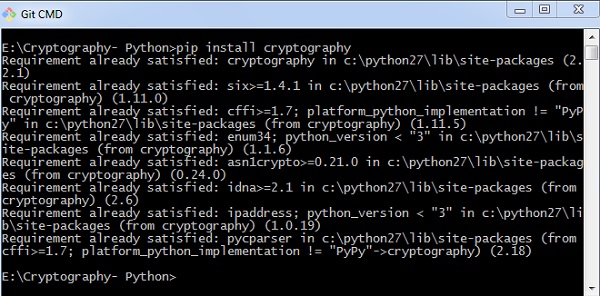Python 密码学 - cryptography 模块
在本章中,您将详细了解 Python 中密码学的各个模块。
cryptography 加密模块
它包括所有的配方和原语,并提供了一个高级的 Python 编码接口。 您可以使用以下命令安装加密模块 −
pip install cryptography

代码
可以使用下面的代码来实现密码学模块 −
from cryptography.fernet import Fernet
key = Fernet.generate_key()
cipher_suite = Fernet(key)
cipher_text = cipher_suite.encrypt("This example is used to demonstrate cryptography module")
plain_text = cipher_suite.decrypt(cipher_text)
输出
上面给出的代码产生以下输出 −

此处给出的代码用于验证密码并创建其哈希值。 它还包括用于验证密码以进行身份验证的逻辑。
import uuid
import hashlib
def hash_password(password):
# uuid is used to generate a random number of the specified password
salt = uuid.uuid4().hex
return hashlib.sha256(salt.encode() + password.encode()).hexdigest() + ':' + salt
def check_password(hashed_password, user_password):
password, salt = hashed_password.split(':')
return password == hashlib.sha256(salt.encode() + user_password.encode()).hexdigest()
new_pass = input('Please enter a password: ')
hashed_password = hash_password(new_pass)
print('The string to store in the db is: ' + hashed_password)
old_pass = input('Now please enter the password again to check: ')
if check_password(hashed_password, old_pass):
print('You entered the right password')
else:
print('Passwords do not match')
输出
场景1 − 如果你输入了正确的密码,你可以看到下面的输出 −

场景2 − 如果我们输入错误的密码,您可以看到以下输出 −

说明
Hashlib 包用于在数据库中存储密码。 在此程序中,使用了salt,它在实现哈希函数之前将随机序列添加到密码字符串中。


